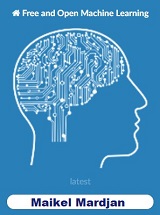
|
FreeComputerBooks.com
Links to Free Computer, Mathematics, Technical Books all over the World
|
|
- Title Free and Open Machine Learning
- Author(s) Maikel Mardjan
- Publisher: Independently published (March 21, 2020); eBook (Living Document, Constantly Updating)
- License(s): CC BY-SA 4.0
- Paperback 268 pages
- eBook HTML and PDF
- Language: English
- ISBN-10/ASIN: B0863S9LQ5
- ISBN-13: 979-8628766279
- Share This:

|
This book describes an open machine learning architecture. Including key aspects that are involved for real business use. It focuses on Free and Open Source Software (FOSS) machine learning software and open datasets.
This book is created to promote and advocate the use of FOSS machine learning for real practical business use cases. Machine learning is a fascinating technology.
Free and Open machine learning should be the norm for business innovation. So simple to use for complex problems.Key machine learning concepts are outlined and a conceptual and logical reference for free and open machine learning architecture is given.
This book is created for everyone who wants to learn and get started with machine learning without being already forced into a specific solution.
Creating Machine learning applications is possible with the use of FOSS building blocks only and on premise. This book crucial outlines machine learning concepts, but will not go into mathematical or technical details. After reading this book you will have a more complete and realistic overview of the possibilities applying machine learning (ML) for your use cases.
This book empowers everyone to make a head start using the powerful machine learning technology in a Free, Open and Simple way.
About the Authors- Maikel Mardjan is a hands-on practical business IT architect and loves to make simple designs for complex IT systems.
- Machine Learning
- Free and Open Source Software (FOSS)
- Deep Learning and Neural Networks
- Artificial Intelligence
 Similar Books:
Similar Books:
-
 Automated Machine Learning: Methods, Systems, Challenges
Automated Machine Learning: Methods, Systems, Challenges
This book presents the first comprehensive overview of general methods in Automated Machine Learning (AutoML), collects descriptions of existing systems based on these methods, and discusses the first series of international challenges of AutoML systems.
-
 A Course in Machine Learning (Hal Daume III)
A Course in Machine Learning (Hal Daume III)
This is a set of introductory materials that covers most major aspects of modern machine learning (supervised learning, unsupervised learning, large margin methods, probabilistic modeling, learning theory, etc.).
-
 The Hundred-Page Machine Learning Book (Andriy Burkov)
The Hundred-Page Machine Learning Book (Andriy Burkov)
Everything you really need to know in Machine Learning in a hundred pages! This book provides a great practical guide to get started and execute on ML within a few days without necessarily knowing much about ML apriori.
-
 Foundations of Machine Learning (Mehryar Mohri, et al)
Foundations of Machine Learning (Mehryar Mohri, et al)
This book is a general introduction to machine learning. It covers fundamental modern topics in machine learning while providing the theoretical basis and conceptual tools needed for the discussion and justification of algorithms.
-
 Machine Learning Yearning (Andrew Ng)
Machine Learning Yearning (Andrew Ng)
You will learn how to align on ML strategies in a team setting, as well as how to set up development (dev) sets and test sets. After finishing this book, you will have a deep understanding of how to set technical direction for a machine learning project.
-
 Dive into Deep Learning (Aston Zhang, et al.)
Dive into Deep Learning (Aston Zhang, et al.)
This is an open source, interactive book provided in a unique form factor that integrates text, mathematics and code, now supports the TensorFlow, PyTorch, and Apache MXNet programming frameworks, drafted entirely through Jupyter notebooks.
-
 Understanding Machine Learning: From Theory to Algorithms
Understanding Machine Learning: From Theory to Algorithms
Explains the principles behind the automated learning approach and the considerations underlying its usage. Provides an extensive theoretical account of the fundamental ideas underlying machine learning and the mathematical derivations.
-
 Machine Learning from Scratch (Danny Friedman)
Machine Learning from Scratch (Danny Friedman)
This book covers the building blocks of the most common methods in machine learning. This set of methods is like a toolbox for machine learning engineers. Those entering the field of machine learning should feel comfortable with this toolbox.
-
 Reinforcement Learning: An Introduction, Second Edition
Reinforcement Learning: An Introduction, Second Edition
It provides a clear and simple account of the key ideas and algorithms of reinforcement learning that is accessible to readers in all the related disciplines. Focuses on core online learning algorithms, with the more mathematical material set off in shaded boxes.
-
 Probabilistic Machine Learning: An Introduction (Kevin Murphy)
Probabilistic Machine Learning: An Introduction (Kevin Murphy)
This book is a comprehensive introduction to machine learning that uses probabilistic models and inference as a unifying approach. It is written in an informal, accessible style, complete with pseudo-code for the most important algorithms.





